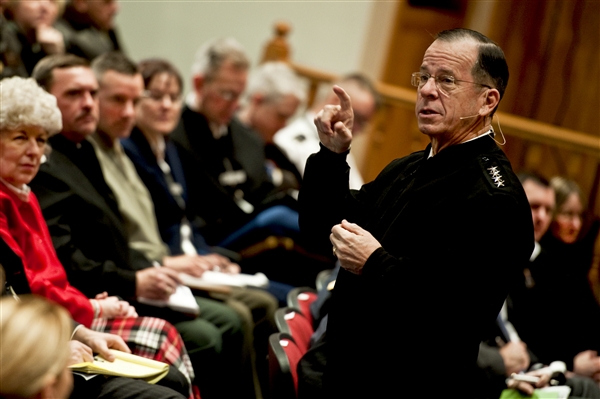WASHINGTON, Sept. 20, 2011 — Although not yet willing to blame the Haqqani network for assassinating the former Afghan president, Pentagon leaders emphasized today that they will continue to pressure Pakistan to keep insurgents there from spilling into Afghanistan.
“Our biggest concern right now is to put as much pressure as possible on the Pakistanis to exercise control from their side of the border,” Defense Secretary Leon E. Panetta said during a Pentagon news briefing with Navy Adm. Mike Mullen, chairman of the Joint Chiefs of Staff.
“We have continued to state that this cannot happen. We cannot have the Haqqanis coming across the border attacking our forces and [Afghans] and disappearing back into a safe haven,” the secretary said. “That is not tolerable, and we have urged them to take steps.”
Panetta declined to discuss specific strategies, including whether the United States would consider unilateral action. He did say, however, “We are going to take whatever steps are necessary to protect our forces.”
It’s in the best interest of the Pakistanis to deal with terrorists within their borders, he said.
“Frankly, terrorism is as much a threat for them as it is for us,” he said. “And we keep telling them you can’t choose among terrorists. If you are against terrorism, you have to be against all forms of terrorism. And that is something we just have to continue to stress.”
Mullen said he made clear during his meeting last week with Pakistani Army Chief of Staff Gen. Ashfaq Parvez Kayani that Pakistan needs to do more. Among issues he raised were the Haqqanis’ proxy ties to Pakistan’s Inter-Service Intelligence agency and their role in killing coalition troops and Afghans in Afghanistan.
“It was the heart of the discussion,” Mullen reported, emphasizing that this activity “has to stop.”
“That is not a new message, but it is one that [Kayani] clearly understands,” Mullen said. “And I think it is one we have to keep reiterating.”
Mullen credited the strong relationship he and Kayani have built with helping them work through difficult periods between their two countries. “It is going to go up and down,” he said of the U.S.-Pakistan relationship. “We have had a very tough patch here over the last several months.”
Based on current information, Mullen said he cannot confirm that the Haqqanis were behind the death of Burhanuddin Rabbani, the senior Afghan official in charge of negotiating with the Taliban. Panetta called the killing of Rabbani, reportedly by a suicide bomber who hid explosives in his turban, a blow to the reconciliation and reintegration process in Afghanistan.
“I regret his loss. I think he was playing an important role,” Panetta said. “I am hopeful that we will be able to work with others to try to continue the efforts that he was engaged in.”
The assassination was among other recent high-profile attacks that Mullen said reflect an apparent shift in the Taliban’s overall strategy.
“They have not succeeded on the ground this year. Their campaign has failed in that regard,” he said, causing them to resort to high-profile attacks.
Marine Corps Gen. John R. Allen, the top U.S. and NATO commander in Afghanistan, described last week’s Haqqani attack on the U.S. Embassy in Kabul an operational failure. Mullen acknowledged, however, that it had strategic significance.
“So we take it very seriously as a part of the campaign,” he said. “We know that this is what the Taliban is doing, and we have got to adjust and we are doing that.”
Panetta said the coalition is working with the Afghans to discuss ways to better protect against future attacks. But the Taliban’s change of strategy, he added, shows that its leaders realize they are losing ground in Afghanistan.
“The bottom line still remains that that we are moving in the right direction,” Panetta said. “We have made progress against the Taliban, but we can’t let some of these sporadic events deter us from the progress that we are making.”
Source:
U.S. Department of Defense
Office of the Assistant Secretary of Defense (Public Affairs)

 von
von 
